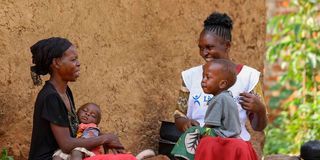How Busia has increased uptake of family planning services

Gladys Nasirumbi (right), a Community Health Worker, attends to Joyce Odiwuor during her door-to-door household visits in Busia County.
What you need to know:
- The Community Health Workers are equipped with educational materials, which they use as a guide on a range of family planning products, how they work, and their side effects.
- After settling on the preferred family planning method, the women are granted referral letters to take to the nearest health facilities.
In the heart of Nahomaki village in Busia County, we find Joyce Oduor, a mother of seven, feeding her one-year child a meal of ugali and beans—her first meal of the day. The noonday sun casts a glow over their simple surroundings—mud-walled, tin roof structures.
Last year at a time like this, Joyce was nursing a one-year-old baby while heavily pregnant with her seventh child. With pregnancies barely allowing for recovery, she had given birth to her sixth child through cesarean section, and the same path seemed set for her youngest.
Had it not been for a family planning procedure she underwent earlier this year; Joyce is certain she would now be pregnant with her eighth child.
Joyce is one of the women in Busia County who have opted for tubal ligation, a birth control surgical procedure done to close fallopian tubes, thereby preventing the fertilisation of eggs by sperm. “I visited Busia County Referral Hospital for the procedure and it's one of the best decisions that I have made,” she reflects.
Failure to plan their family had seen her have children at a close range against the backdrop of harsh economic times that was taking a toll on them.
She says it was difficult to secure jobs from neighbours due to the constant demand for attention from the two young children.
“I have also been sickly since the last two pregnancies. Health worker advised that my body needed rest,” she explains.
In 2019 after giving birth to her fifth born, Joyce visited a health facility within the county to kick-start her family planning journey.
But the daily pills she got resulted in continued back ache and a reduced sex drive, often sparking conflicts between her and her husband. She later resorted to injectables but once again, the side effects of continued bleeding in between the monthly cycles were unbearable.
When she called it quits towards the end of last year, Joyce conceived her second last born and a year and a half later, she conceived again.
“I was stressed for the most part of last year and at one point I contemplated terminating the pregnancy. I was getting weaker by the day and was unable to supplement my husband’s income since I rely on menial jobs, which require energetic individuals,” she notes, adding that her husband works as a watchman.
She explains that her decision to undergo tubal ligation was inspired by a Community Health Worker (CHW) in Busia County.
Gladys Nasirumbi, the CHW who encouraged Joyce to undergo tubal ligation, notes that the use of birth control methods inthe county was shrouded in misconceptions such as weight gain, reduced sexual pleasure, and permanent infertility among others.
To increase the uptake of family planning products, the Busia County government has partnered with Living Goods, a non-governmental organisation, to empower CHWs who conduct health education on various family planning products. The CHWs are equipped with educational materials, which they use as a guide on a range of family planning products, how they work, and their side effects. After settling on the preferred family planning method, the women are granted referral letters to take to the nearest health facilities.
According to the Kenya Demographic Health Survey 2022, 55 per cent of people between the age of 15 to 45 in Busia County have embraced modern contraceptives.
Susanne Mercy,23, also a resident of Busia County, says she is currently on contraceptives after giving birth to two children in a span of two years. Her decision followed the monthly visits by the CHWs who had offered her extensive education on family planning.
“Our major role is conducting health education and linking up the willing clients to health facilities for the products,” says Patrick Adera, Living Goods Government Relations Manager.
The county Community Health Services focal person Emmanuel Lubai says the decision to involve the CHWs in the door-to-door campaigns currently being undertaken in six out of the seven sub-counties in Busia was due to low uptake of the commodities.
“Initially we were at 25 per cent but as we speak, we are seeing up to 45 per cent of the eligible women coming forward for the products. We left out Teso North since it is acting as our control centre, but plans are underway to upscale it in the area,” says Mr Lubai.
The county’s Health Chief Officer Suzan Outa says one of the reasons behind the success of the programme is working with motivated and well informed CHWs.





